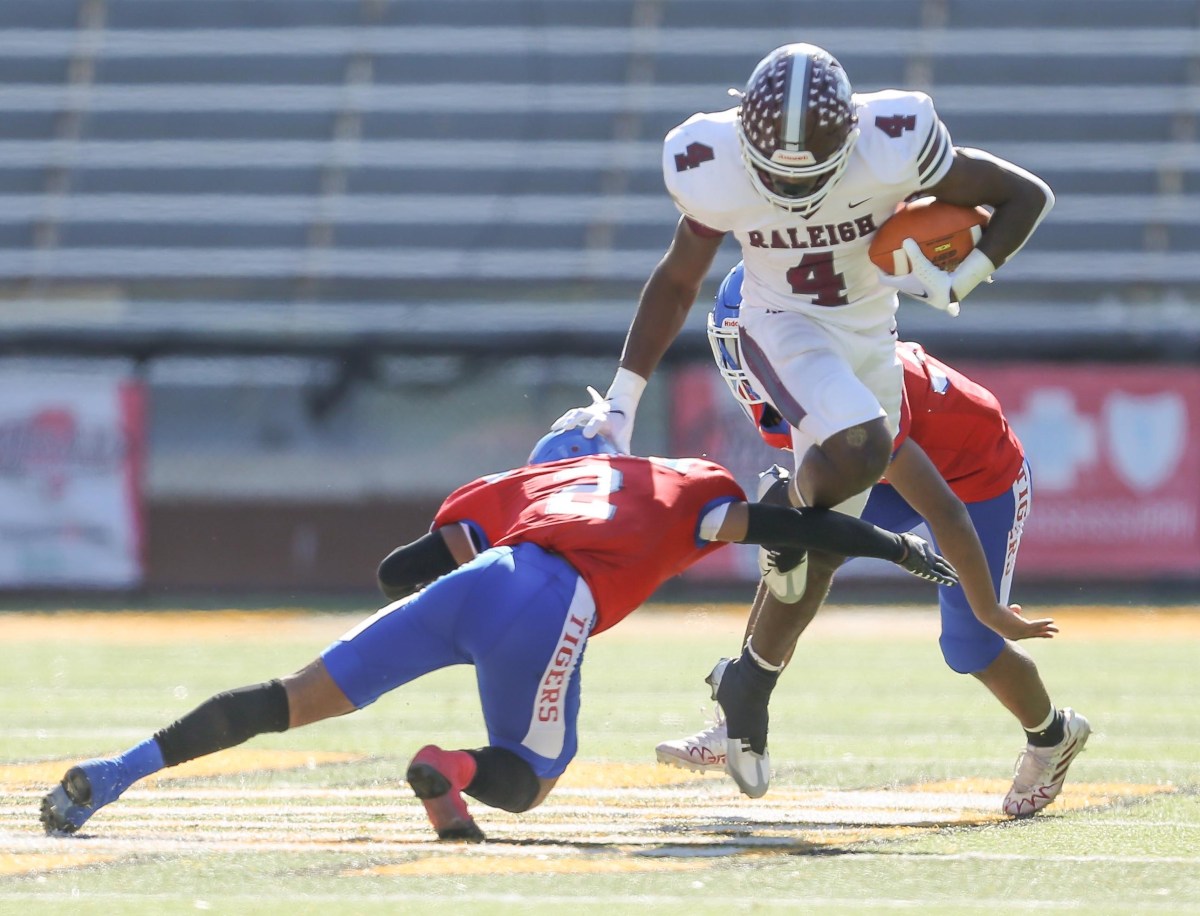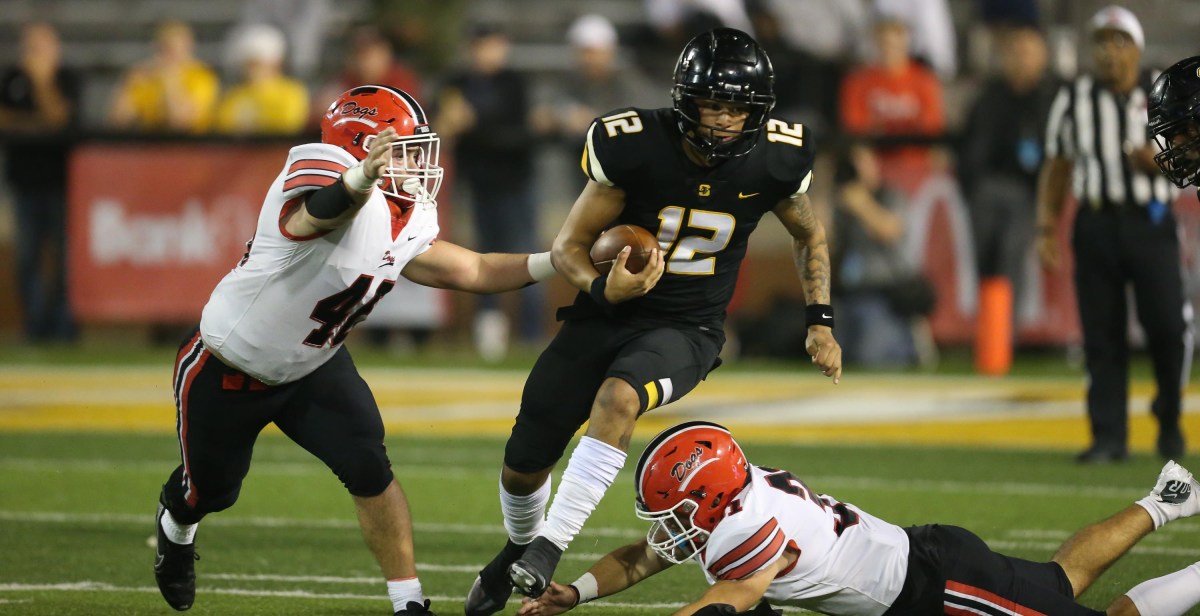Mississippi Today
Six state championships display thrill of victory, agony of defeat
Six state championships display thrill of victory, agony of defeat
HATTIESBURG — The Mississippi High School Activities Association State Football Championships rarely disappoint when it comes to drama – the thrill of victory and the agony of defeat, as “Wide World of Sports” Hall of Fame broadcaster Jim McKay famously put it.
The 2022 championship games, played Friday and Saturday at The Rock at Southern Miss, were no exception. The weekend produced shootouts – such as Raleigh’s 55-52 triumph over Noxubee County in the Class 3A game – and defensive struggles, such as Lousville’s 17-14 conquest of Mendenhall in the Class 4 A championship.
We saw some of the state’s most highly recruited college prospects, streamlined physical athletes such as Raleigh’s Suntarine Perkins and Picayune’s Dante Dowdell. We saw magnificent high school players such as Scott Central’s bowling ball of a quarterback, Quez Goss (5-feet, 9 inches, maybe, and 220 pounds). Get this: In back to back state championships, Goss has produced a total of 14 touchdowns, while his Scott Central team has scored 112 points.
Picayune, winning its second straight 5A championship, emerged as the state’s only undefeated team. With seemingly the entire citizenry of Picayune filling the lower deck on the east side at The Rock, the Maroon Tide finished a perfect 15-0 with only one victory coming by fewer than 10 points.
Louisville won its 11th state championship, tying it with West Point for most football state championships among Mississippi public schools.
Starkville’s championship season deserves special recognition. The Yellowjackets, beset by a brutal schedule and key injuries, lost three straight games in September and October before regrouping to win its last eight, including four straight in the playoffs. Asked who made up that brutal schedule, Jones responded, “I did. You don’t get any better playing cupcakes.”
So, let’s recap the games in the order they were played.

Class 3A: Raleigh 55, Noxubee County 52
What a way to start the weekend: In Raleigh’s 55-52 Class 3A championship victory over Noxubee County, the two teams combined for a MHSAA playoffs record 107 points – not to mention 14 touchdowns, 45 first downs and nearly 1,000 yards of offense. There were only two punts, both by Noxubee.
Rarely, if ever, has an MVP trophy belonged to a more obvious winner. Suntarine Perkins, Raleigh’s do-it-all superstar, provided 331 yards and four touchdowns rushing. He caught three passes for 56 yards. He kicked off. He led his team in tackles and he made a crucial fourth quarter interception to preserve the victory.
Perkins, a heavily muscled, 6-foot-3, 205-pound player, showed why virtually every college coach in the country would love to have him and why Ole Miss head coach Lane Kiffin and Alabama defensive coordinator Pete Golding watched the game from field level, just behind the north end zone. Afterward, Perkins confirmed that Ole Miss, to whom he has verbally committed, and Alabama, are the last two suitors he is considering. One or the other is going to get a remarkable athlete – and take a huge NIL hit – when Perkins signs on the dotted line. He said that will happen “sometime in December.”
It took all of Perkins’ heroics to get the victory. Noxubee County, a perennial Mississippi high school powerhouse, fought all the way to the final gun. Keep this name in mind for future reference: Kamario Taylor. Just a 10th grader, the long-limbed, 6-4, 180-pounder kept Noxubee in it, throwing for five touchdowns.
Taylor was marvelous, but Perkins was even better. He sprinted 74 yards for a touchdown, out-running much smaller people, the first time he touched it. He was just getting started.
Asked how he felt afterward, Perkins smiled. “Real good,” he said, “but my legs I gotta admit are a little tired.”

Class 1A: Bay Springs 22, McEvans 0
Mississippi State commit Tyrick Jones rambled for 136 yards and two touchdowns on 16 carries but it was the Bay Springs defense, which much included Jones, that sparked the Bulldogs to the school’s second straight state championship. After Friday’s first game produced 107 points, Bay Springs allowed none, serving to reinforce the age-old adage: Defense wins championships.
Bay Springs did not complete a single pass, but ran for 270 yards and allowed McEvans only 149 yards of total offense. Why throw it if you don’t need to?
It was Bay Springs’ sixth shutout of the season and the 11th time the Bulldogs have held an opponent to one score or fewer scores. McEvans had averaged 42 points per game in three previous playoffs victory but couldn’t crack the Bay Springs defense, which did not give up a score in four playoffs games.
Said Jones, a 225-pounder who likely will play on the defensive side of the ball at State, “Our plan was to run the ball down their throat, and that’s what we did. We were going to pound and pound it until they quit.”

Class 5A: Picayune 31, West Point 21
Defending State 5A Champ Picayune fell behind perennial powerhouse West Point 14-3 Friday night but there was no panic along the Maroon Tide sidelines. When you have a stable of running backs, led by four star recruit Dante Dowdell, why panic?
After running for 190 yards and three touchdowns, Dowdell, the MVP, explained, “We’ve got a lot of guys that have heart. When we get a head of steam and start going downhill, we’re hard to stop.”
Chris Smith also ran for 104 yards for the Maroon Tide, which was playing West Point in the state championship game for the second consecutive year. Dowdell, who stands 6 feet, 1 inch and weighs 215 pounds, displayed a remarkable blend of speed and power against a normally salty West Point defense.
“He’s a great player,” Picayune coach Cody Stogner said of Dowdell. “Sometimes you just gotta let a great player play. We’ve had him for four years, and he’s just gotten better and better every year. We lean on him heavily, and we did again tonight. Like always, he delivered.”

Class 4A: Louisville 17, Mendenhall 14
Make that 11 for 11 for the Lousville Wildcats. After defeating Mendenhall 17-14 for the 4A State Championship Saturday, the Wildcats have advanced to a state championship game 11 times. They have won all 11. None could have been any more difficult than the three-point victory over the Mendenhall Tigers.
Junior Ceidrick Hunt booted a 27-yard field goal as time expired to give Louisville the winning margin in a game mostly dominated by the two defenses.
You think there isn’t pressure to win in a tradition-rich program such as Louisville? “I didn’t want to be the first coach (at Louisville) to come down here and lose in the finals,” said Louisville head coach Tyrone Shorter.
It looked like that might happen. Mendenhall was driving late in the fourth quarter when the Wildcats forced the game’s only turnover. Senior Gabe Moore forced a fumble, which was recovered by sophomore Ja’cari Owens at the Mendenhall 43-yard-line with 32 seconds remaining in regulation. Senior quarterback Keyarrion Jackson led a short drive to produce the game-winning field goal.
Louisville is now tied with West Point for most state championships among Mississippi public schools teams. Both have won 11. Said Jackson, “Now we’re part of the legacy.”

Class 2A: Scott Central 42, Charleston 12
Next season, the Class 2A State Championship can be someone else’s playground. Scott Central quarterback Quez Goss won’t be around to show off again. Goss, who accounted for eight touchdowns in Scott Central’s 70-26 romp over Leflore County last December, was responsible for six more in the Rebels’ 42-12 pasting of Charleston Saturday.
Goss plays a lot taller than his 5 feet, 9 inches. He throws the deep ball with uncanny accuracy. And he throws primarily to two senior wide receivers who can go up and get it. Southern Miss commit Javieon Butler hauled in five catches for 131 yards and two touchdowns, while Antreyvious Edwards had three catches for 133 yards and three touchdowns.
“When you’ve got guys like those, it makes my job so much easier,” Goss said. “I just launch it downfield and let them go get it.”
Goss was being overly modest. He finished 9-of-14 passing for 281 yards with five touchdowns and also added a rushing touchdown. He was a clear cut for choice for MVP for a second consecutive season.
Since 1999, Scott Central has won four state championships and been the runner-up twice.

Class 6A: Starkville 48, Brandon 32
Oddsmakers don’t make point spreads for high school football games, but powerhouse Brandon, which entered at 12-1, would have been favored over a Starkville team that started 0-3 in its own region this season. But Starkville took control at the beginning and coasted to the championship victory.
Junior quarterback Trey Petty led the way, throwing for two touchdown and running for three more. He was named the MVP but Starkville coach Chris Jones had another name for him. “He’s a dog,” Jones said. “I’m happy he’s on my team. He does a good job, and has been doing a good job all year. He had a rough patch early in the year when he was struggling and playing through injuries, but he bounced back. That’s what champions do.”
Starkville scored on seven of its 10 possessions and four of its first six. The Yellowjackets led 21-3 at halftime and then 28-3 early in the third quarter. Brandon finally got its offense in gear in the second half, but by then it was too late. Quarterback Landon Varnes passed for 297 yards and halfback Nate Blount powered for 184 yards on 24 carries, but it was not nearly enough.
The championship was the seventh in Starkville history but the first since 2015. Chris Jones has now won state championships at both Kemper County and Starkville.
This article first appeared on Mississippi Today and is republished here under a Creative Commons license.
Mississippi Today
‘Will you trust us?’: JPS plan for stricter cellphone policy makes some parents anxious
Superintendent Errick Greene wanted to be very clear with the roughly 50 parents who attended Thursday night’s community listening session: Jackson Public Schools already has a policy banning students from using cellphones at school.
But the leadership of Mississippi’s third-largest school district has decided that a new approach is in order, citing a series of incidents in recent years involving students using their cellphones to bully others, organize fights or text their parents inaccurate information about violence happening at or near their school.
“To be clear, it’s not the majority of our scholars, but I can’t look at a class and know who’s gonna be bullying today, who’s gonna be scheduling a meetup to cut up today,” Greene said toward the end of the hour-long meeting held at the JPS board room. “I can’t look at a group of scholars and say, ‘OK, yeah, you’re the one, let me take your phone, the rest of you can keep it.’”
Under the rewritten policy, students who take their phone out of their backpacks during the instructional day will lose it for five days for the first infraction, 10 days for the second and 45 days for the third. Currently, the longest the school will hold a phone is 10 days.
The Jackson school board is expected to consider the new policy at its meeting next week and the district hopes to implement the change when the new school year starts later this month, said Sherwin Johnson, the district’s communications director.
Students also currently have the option to pay up to a $25 fine to get their phone back, but the district wants to rescind that aspect of the policy.
“We’ve discovered that’s not equitable,” said Larrisa Harris, the JPS general counsel. “Not everybody has the resources to come and pay the fine.”
Support for the new policy among the parents who spoke at the listening session varied, but all had questions. How will students access the internet on their laptops if the WiFi is spotty at their school and they need to use their cellphone hotspot? If students are required to keep their phones in their backpacks during lunch, how will teachers prevent stealing? How will JPS enforce the ban on using cellphones on the bus?
One mother said she watches her daughter’s location while she rides the bus to Jim Hill High School so she knows her daughter made it safely.
“If they can’t have it on the bus, who’s gonna enforce that?” she said. “I’m just gonna be real, the bus driver got to drive.”
A common theme among parents was anxiety at the prospect of losing direct contact with their kids in the event of an emergency. A Pew Research survey found that most adults, regardless of political affiliation, support cellphone bans in middle and high school classes. But those who don’t say it’s because their child can use their phone during emergencies.
“If something happened, will we get an automatic alert to notify us? Because a lot of the time we see things on social media first,” said Ashley McIntyre, a mother of three JPS students. She attended the meeting with her eldest daughter, Aaliyah, who recently graduated from Powell Middle School.
Though JPS does have an alert system for parents, McIntyre said she didn’t know if it existed. She cited a bomb threat at Powell last year that she found out about because Aaliyah texted her, not through a school alert.
“We didn’t know what was going on, and she texted me, ‘Mom, I’m scared,’ so I went up there,” McIntyre said. “So that puts us on edge.”
Aaliyah said she uses her phone to text her mom and watch TikTok, but she feels like her classmates use their phones to be popular or to fit in. When a fight happens, she said many students pull out their phones to record instead of trying to get an adult who can stop it. Then the videos end up on Instagram pages dedicated to posting fights in JPS.
“Once the principal found out about the fight pages, they came around looking inside our videos and camera rolls,” she said. “It happened to me last year. They thought I had a fight on my phone.”
Toward the end of the meeting, Laketia Marshall-Thomas, the assistant superintendent for high schools, took the mic to respond to one parent who said she was concerned that older students would not come to school if they knew their phone could be taken.
“What we have seen is, it’s the older students—” Marshall-Thomas began.
“They are the problem,” someone from the audience chimed in.
“We’re not saying they cannot have them,” she continued. “We know that they have after school activities and they need to communicate with their moms … but we have had major, major issues with cellphones and issues that have even resulted in criminal outcomes for our scholars, but most importantly, our students … have experienced a lot of learning loss.”
While the district leadership did not go into detail about the criminal incidents, several pointed to instances where students have texted their parents inaccurate information, such as an unsubstantiated rumor there was a gun during a fight at Callaway High School or that a shooting outside Whitten Middle School occurred on school property.
“Having phones actually creates far more chaos than they help anyone,” Greene said.
While cellphones have been banned to varying degrees in U.S. schools for decades, youth mental health concerns have renewed interest in more widespread bans across the country. Cellphone and social media usage among school-aged kids is linked to negative mental health outcomes and instances of cyberbullying, research shows.
At least 11 states restrict or ban cellphone use in schools. After Mississippi’s youth mental health task force recommended that all school districts implement policies that limited cellphone and social media usage in classrooms, a bill that would’ve required school boards to create cellphone policies died during the legislative session. Still, several Mississippi school districts have passed their own policies, including Marshall County and Madison County.
Another concern about the ban was a belief among a couple of speakers at the meeting that cellphones can help parents hold the district accountable for misdeeds it may want to hide.
“I just saw a video today. It was not in JPS, but it was a child being yelled at by the teacher and had he not recorded it, his momma would have never known that this sweet lady that they go to church with is degrading her child like that,” one mother said.
Statements like these prompted responses from teachers and other parents who urged the skeptical attendees to be more trusting or to make sure the district has updated contact information for them in case school officials need to reach parents during an emergency.
“I think we have to trust the people watching over our children,” said one of the few fathers who spoke. “When I grew up, what the teacher said was gold.”
One teacher asked the audience, “Will you trust us?”
This article first appeared on Mississippi Today and is republished here under a Creative Commons Attribution-NoDerivatives 4.0 International License.
The post ‘Will you trust us?’: JPS plan for stricter cellphone policy makes some parents anxious appeared first on mississippitoday.org
Note: The following A.I. based commentary is not part of the original article, reproduced above, but is offered in the hopes that it will promote greater media literacy and critical thinking, by making any potential bias more visible to the reader –Staff Editor.
Political Bias Rating: Centrist
The article presents a balanced report on Jackson Public Schools’ proposed stricter cellphone policy without taking a clear ideological stance. It fairly conveys the perspectives of school officials emphasizing discipline and safety, alongside parental concerns about communication and emergency access. The tone remains neutral, focusing on factual details such as policy changes, reasons behind them, and community reactions. While it includes some skepticism from parents and responses from district staff, the language does not endorse or oppose either side. Overall, the coverage adheres to neutral, factual reporting by presenting multiple viewpoints without editorializing.
Mississippi Today
Hospitals see danger in Medicaid spending cuts
Mississippi hospitals could lose up to $1 billion over the next decade under the sweeping, multitrillion-dollar tax and policy bill President Donald Trump signed into law last week, according to leaders at the Mississippi Hospital Association.
The leaders say the cuts could force some already-struggling rural hospitals to reduce services or close their doors.
The law includes the largest reduction in federal health and social safety net programs in history. It passed 218-214, with all Democrats voting against the measure and all but five Republicans voting for it.
In the short term, these cuts will make health care less accessible to poor Mississippians by making the eligibility requirements for Medicaid insurance stiffer, likely increasing people’s medical debt.
In the long run, the cuts could lead to worsening chronic health conditions such as diabetes and obesity for which Mississippi already leads the nation, and making private insurance more expensive for many people, experts say.
“We’ve got about a billion dollars that are potentially hanging in the balance over the next 10 years,” Mississippi Hospital Association President Richard Roberson said Wednesday during a panel discussion at his organization’s headquarters.
“If folks were being honest, the entire system depends on those rural hospitals,” he said.
Mississippi’s uninsured population could increase by 160,000 people as a combined result of the new law and the expiration of Biden-era enhanced subsidies that made marketplace insurance affordable – and which Trump is not expected to renew – according to KFF, a health policy research group.
That could make things even worse for those who are left on the marketplace plans.
“Younger, healthier people are going to leave the risk pool, and that’s going to mean it’s more expensive to insure the patients that remain,” said Lucy Dagneau, senior director of state and local campaigns at the American Cancer Society.
Among the biggest changes facing Medicaid-eligible patients are stiffer eligibility requirements, including proof of work. The new law requires able-bodied adults ages 19 to 64 to work, do community service or attend an educational program at least 80 hours a month to qualify for, or keep, Medicaid coverage and federal food aid.
Opponents say qualified recipients could be stripped of benefits if they lose a job or fail to complete paperwork attesting to their time commitment.
Georgia became the case study for work requirements with a program called Pathways to Coverage, which was touted as a conservative alternative to Medicaid expansion.
Ironically, the 54-year-old mechanic chosen by Georgia Gov. Brian Kemp to be the face of the program got so fed up with the work requirements he went from praising the program on television to saying “I’m done with it” after his benefits were allegedly cancelled twice due to red tape.
Roberson sent several letters to Mississippi’s congressional members in weeks leading up to the final vote on the sweeping federal legislation, sounding the alarm on what it would mean for hospitals and patients.
Among Roberson’s chief concerns is a change in the mechanism called state directed payments, which allows states to beef up Medicaid reimbursement rates – typically the lowest among insurance payors. The new law will reduce those enhanced rates to nearly as low as the Medicare rate, costing the state at least $500 million and putting rural hospitals in a bind, Roberson told Mississippi Today.
That change will happen over 10 years starting in 2028. That, in conjunction with the new law’s one-time payment program called the Rural Health Care Fund, means if the next few years look normal, it doesn’t mean Mississippi is safe, stakeholders warn.
“We’re going to have a sort of deceiving situation in Mississippi where we look a little flush with cash with the rural fund and the state directed payments in 2027 and 2028, and then all of a sudden our state directed payments start going down and that fund ends and then we’re going to start dipping,” said Leah Rupp Smith, vice president for policy and advocacy at the Mississippi Hospital Association.

Even with that buffer time, immediate changes are on the horizon for health care in Mississippi because of fear and uncertainty around ever-changing rules.
“Hospitals can’t budget when we have these one-off programs that start and stop and the rules change – and there’s a cost to administering a program like this,” Smith said.
Since hospitals are major employers – and they also provide a sense of safety for incoming businesses – their closure, especially in rural areas, affects not just patients but local economies and communities.
U.S. Rep. Bennie Thompson is the only Democrat in Mississippi’s congressional delegation. He voted against the bill, while the state’s two Republican senators and three Republican House members voted for it. Thompson said in a statement that the new law does not bode well for the Delta, one of the poorest regions in the U.S.
“For my district, this means closed hospitals, nursing homes, families struggling to afford groceries, and educational opportunities deferred,” Thompson said. “Republicans’ priorities are very simple: tax cuts for (the) wealthy and nothing for the people who make this country work.”
While still colloquially referred to as the One Big Beautiful Bill Act, the name was changed by Democrats invoking a maneuver that has been used by lawmakers in both chambers to oppose a bill on principle.
“Democrats are forcing Republicans to delete their farcical bill name,” Senate Democratic Leader Charles Schumer of New York said in a statement. “Nothing about this bill is beautiful — it’s a betrayal to American families and it’s undeserving of such a stupid name.”
The law is expected to add at least $3.3 trillion to the nation’s debt over the next 10 years, according to the most recent estimate from the Congressional Budget Office.
This article first appeared on Mississippi Today and is republished here under a Creative Commons Attribution-NoDerivatives 4.0 International License.
The post Hospitals see danger in Medicaid spending cuts appeared first on mississippitoday.org
Note: The following A.I. based commentary is not part of the original article, reproduced above, but is offered in the hopes that it will promote greater media literacy and critical thinking, by making any potential bias more visible to the reader –Staff Editor.
Political Bias Rating: Center-Left
This article reports on the negative impacts of a major federal tax and policy bill on Medicaid funding and rural hospitals in Mississippi. While it presents factual details and statements from stakeholders, the tone and framing emphasize the harmful consequences for vulnerable populations and health care access, aligning with concerns typically raised by center-left perspectives. The article highlights opposition by Democrats and critiques the bill’s priorities, particularly its effect on poor and rural communities, suggesting sympathy toward social safety net preservation. However, it maintains mostly factual reporting without overt partisan language, resulting in a moderate center-left bias.
Crooked Letter Sports Podcast
Podcast: The Mississippi Sports Hall of Fame Class of ’25
The MSHOF will induct eight new members on Aug 2. Rick Cleveland has covered them all and he and son Tyler talk about what makes them all special.
Stream all episodes here.
This article first appeared on Mississippi Today and is republished here under a Creative Commons Attribution-NoDerivatives 4.0 International License.
The post Podcast: The Mississippi Sports Hall of Fame Class of '25 appeared first on mississippitoday.org
-
News from the South - Texas News Feed7 days ago
Hill Country flooding: Here’s how to give and receive help
-
The Center Square5 days ago
Here are the violent criminals Judge Murphy tried to block from deportation | Massachusetts
-
News from the South - Kentucky News Feed5 days ago
Woman arrested in Morgantown McDonald’s parking lot
-
News from the South - North Carolina News Feed7 days ago
Raleigh caps Independence Day with fireworks show outside Lenovo Center
-
News from the South - Kentucky News Feed6 days ago
Cruising into Louisville: Viking cruise ship docks downtown on Ohio River
-
News from the South - Oklahoma News Feed5 days ago
Cell, no! After Two Years of Debate, Schools Get Months to Ban Phones
-
News from the South - Florida News Feed5 days ago
Texas flooding: Search for survivors continues
-
News from the South - South Carolina News Feed6 days ago
Keep your pets safe during hurricane season: experts share advice on go-bags and safe spaces
















































